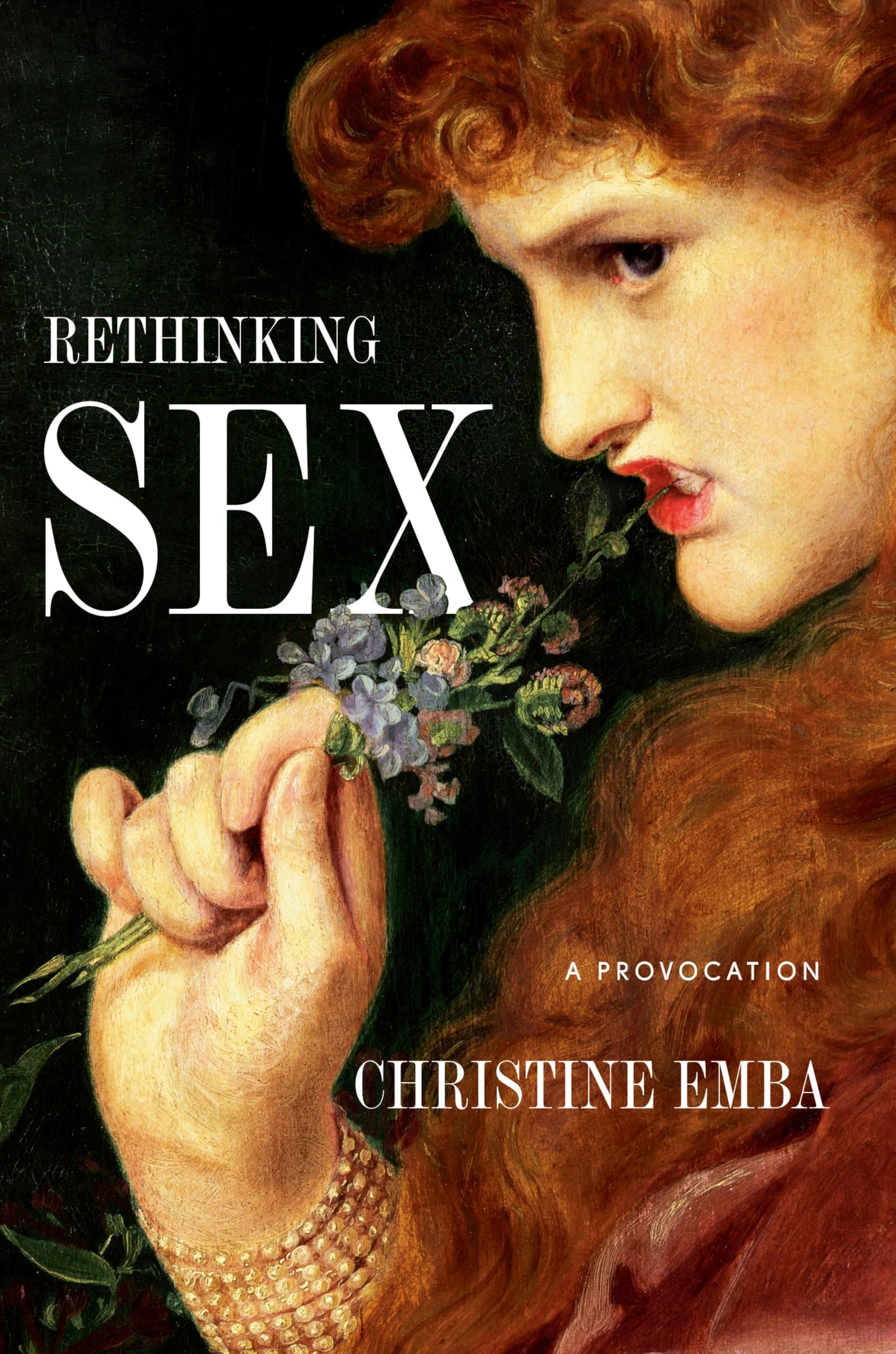I
If I’m being totally honest, my first thought after finishing Christine Emba’s Rethinking Sex: A Provocation was “I might be too old to fairly review this book.”
My husband and I began dating in 2012, the very year before—as Emba informs me—a majority of newly formed couples began to meet online rather than through more traditional methods of in-person social networks. In the darkest, most difficult moments of our marriage, we do look at one another and think the same thought in tandem: “At least we never had to go on Tinder.” We then work toward ensuring that this remains true forever.
Emba’s book makes a convincing case that our old, married perceptions of the modern single person’s life are largely right: single life looks terrible now, and we don’t envy anyone trying to pair in the current cultural environment. From online dating apps and the rapidly changing norms around sexual consent, to the general decline in sexual activity among young people, the old and the married cannot look on the current dating market with resentment. The phrase “the living will envy the dead” comes to mind.
Rethinking Sex explores the cultural narratives and norms that got us to this point: the idea of consent as the primary rubric of sexual ethics, the growth of online dating, the normalization of pornography and more extreme sexual practices—all of which seem to be culminating in a dehumanized and viciously competitive sexual marketplace in which women are pressured to “consent” to casual sex that is neither pleasurable nor rewarding.
Emba claims that her view is a “provocation,” and yet the fundamental thesis is not only not particularly provocative, it’s practically orthodox. Her suggestion, that many of these trends toward progressively greater liberation of sexuality and sexual norms are in fact psychologically and sometimes physically damaging, would only be considered provocative in left-leaning social milieux that have abandoned traditional value structures.
Which raises basic questions for me: Who is this book aimed at? And how well does her nightmarish description about the current state of dating and sex actually reflect life for anybody outside of a fairly contained progressive bubble of young people living in a downtown North American core? Whose sex is being rethought here?
I will note here that while overall marriage rates in the US are in decline, that trend seems to be amended by a concurrent rise in cohabitation rates. Divorce rates are actually declining. Meanwhile, the ratio of individuals who are living with a partner at any given time has remained unchanged since the 1990s.
Now, we can certainly debate the social utility of a trend toward less committed domestic partnerships, and the figures do concede that values and norms are shifting. However, these data don’t paint a picture in which all young people abandon all committed relationships for all time; we don’t seem to be moving into a new era defined by a radical state of perpetual casual sex and singledom. The process by which singles find long-term partners may be more onerous and fraught than in previous generations, but most people do seem to be seeking meaningful relationships. This fact, of course, does not invalidate Emba’s concerns about the state of the dating market; however, it does narrow the field of people to whom these concerns are likely applicable. Single twentysomething urbanites do not constitute a majority of the population, and so her book is not really about rethinking sex as much as it is about rethinking dating.
Tinder hopping—which Emba rightly condemns as a manic, dehumanizing process by which sexual partners are ordered like pizza—seems to be a phenomenon that is limited to a particular time of life, specific geographic locations, and, where this is not true, perhaps even to social classes that are less inclined to commit and marry. And what obstacles do exist may be the result of economics as much as shifting cultural norms—a realm that Emba leaves curiously unexplored despite her many half-articulated complaints of capitalism.
Emba attributes much of modern sexual excess to the ruthless logic of capitalism taken to its inevitable endpoint. There is truth to this; unrestrained markets seek to commodify everything about human needs and experience. But are we to believe that pre-capitalistic societies had some greater respect for sexual ethics, bodily autonomy, or mutual pleasure? Was the marriage market of, say, 1520 more renowned for the “good sex” that Emba seeks? Granting the evils of Tinder, what time or place in history would we rather be born women? It’s not a coincidence that feminism, and the basic concept of women as real, legal people with inherent rights and interests, developed in parallel with freer market economies—ones in which women could trade their skills and labour in addition to their bodies by prostitution or marriage. I read Emba’s half-baked critiques of capitalism as a sop to her progressive peer group rather than a fully-fleshed-out thesis about the impact of unrestrained free markets on sexual conduct.
Where Emba does hit the mark—especially for her audience—is a more thorough discussion of the rise of “consent” as the defining standard of what constitutes ethical sex. For old marrieds like myself, the consent framework is a paradigm shift. For those of us who came of age well before #MeToo, the process of procuring the kind of sexual consent that would pass muster on Twitter sounds bland and corporatized, reducing the unexpected, fun, and fluid nature of human sexuality to a series of ritualized and lawyerly affirmations. No wonder so few young people are having sex nowadays: this “liberated” generation has turned sex into something that sounds joyless, rigid, and puritanical.
Who wants to be asked to be kissed?
Anyway, Emba points out that the consent framework is also, paradoxically, inadequate. The prevalence of casual sex disadvantages biological women who are disproportionately more likely to be seeking long-term relationships and partners. As sexual liberation becomes the norm, then, women have to “consent” more often and to a wider variety of sexual acts in order to compete in a marketplace in which they are vying for partners not only against other women but now also against always-available hard-core pornography that redefines sexual expectations and standards of conduct and behaviour.
To what extent can a woman truly “consent” in these conditions? (A question raised by radical feminists for decades now.) And just because a woman may have consented to sex does not mean that she will necessarily have enjoyed it; nor does it mean the act is ultimately in her own individual best interest.
“Consent” doesn’t begin to encompass all of what is necessary in a true discussion of sexual ethics, which ought to include some thought toward shared expectations, good connection and communication, and mutual pleasure. Our “yes means yes” pursuit of enthusiastic consent seems to leave a lot of young women confused and unhappy with the outcomes they ostensibly “consented” to. Here’s where we begin to see a blurring of the line between sex that is unsatisfying, regrettable, uncomfortable, or even painful, and sex that is not-consensual, a term that can also mean rape.
Our “yes means yes” pursuit of enthusiastic consent seems to leave a lot of young women confused and unhappy with the outcomes they ostensibly “consented” to.
Emba also notes that the consent framework doesn’t address the fact that the disparities witnessed in the sexual marketplace are innate and unavoidable, the inevitable biological and psychological result of the fact that men and women are different. Again, this is one of those risky and controversial things to point out—to a narrow collection of progressive, broadly urban leftists who seem to be insisting on biology as a pure social construct. To which the rest of the human race says, “Good luck with that!”
My real critique of Emba’s book is that I think it focuses too narrowly on her own peer group: largely heterosexual, well-educated, progressive, middle- to upper-middle-class young people whose dating experience is constrained by a narrow set of cultural and social norms. This is the water of the book; and if Emba wanted to write a more broadly relatable and applicable treatise on the state of modern sexuality, I wish she had included a much broader range of people: older individuals, married ones, couples who have been together for many years, and people whose explorations with sexuality ranged a little further afield.
I also wish she had the courage of her own convictions. Again and again, I got the impression that she was eager to outright condemn some practice, but ultimately failed.
For example, she stumbles at the edges of the claim that things like BDSM, pornography, or bedroom choking are inherently bad regardless of whether they are consented to. But Emba either lacks the data or the rhetorical skill to make those claims clearly and assertively.
The result is a section of confused reasoning.
For example, in one section she goes on about a peer at a party who confided in her a case of “surprise choking.” That is, during sex, a partner began to choke her—a practice, Emba notes, that appears to be growing more standard during sexual encounters.
Is choking an inherently bad or dangerous practice? Emba seems to think so, but she doesn’t really prove it beyond noting that choking often seems to be a precursor to domestic assault. I would ask her: Is sexual choking bad even in cases where it is used as a form of erotic foreplay? What if both partners want to engage in this practice? What if consenting sexual partners in a long-term monogamous relationship choose to engage in BDSM, or watching pornography, or polyamory, or anal sex, or choking? Is it bad then? Is it possible that a couple engaged in regular BDSM might be healthy, happy, and functional, while a couple that prefers more conventional sexual practices is, in fact, abusive and dysfunctional? Surely context matters.
Emba spends much time talking about how consent is an inadequate framework for sexual ethics, but then illustrates that point with a sexual practice—surprise choking—that is emphatically not consensual.
Consent is a bare minimum, and we should attempt to define a sexual ethic that requires us also to be decent, empathetic, and kind to one another.
What we’re left with here is the author’s assumption that “conventional” sexual relations—presumably gentle sex between people who at least know and respect one another, acts that leave everyone feeling healthy and happy—are always inherently positive. Everything else is a product of some kind of false consciousness, or capitalism run amok. Would it be unkind to point out that there is something that feels confused, and even sexually naïve, about much of her argument?
On the whole, Rethinking Sex is not as controversial as I think Emba believes it to be, and that probably makes it a necessary book for readers in her peer group. It ought to be far less risky for a writer to point out that casual sex isn’t a particularly gratifying long-term dating strategy. At its core, Emba’s message is perfectly sound—consent alone isn’t adequate for what she calls “good sex.” Consent is a bare minimum, and we should attempt to define a sexual ethic that requires us also to be decent, empathetic, and kind to one another. We ought to open our cultural dialogue on these lines.
All for the good. However, I would be curious to see how Emba returns to this book and evaluates it when she’s an old married woman like me.




